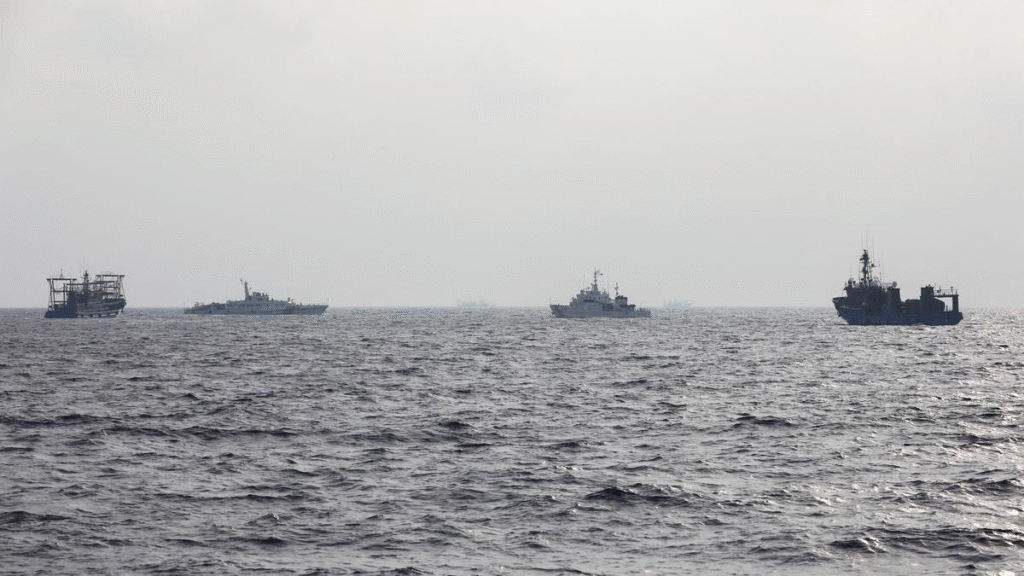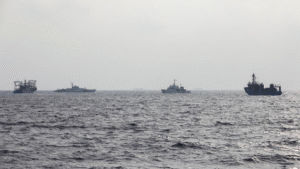Blame Game in the South China Sea: A Recurrent Confrontation Between China and the Philippines
The strategic waters of the South China Sea have once again become a flashpoint, with China and the Philippines engaging in a familiar exchange of accusations following a recent confrontation between their vessels. This incident, occurring near disputed features like Sandy Cay and Subi Reef, underscores the persistent tensions and the deeply entrenched claims that continue to destabilize this vital maritime region.

The Latest Skirmish and Philippine Accusations
The latest skirmish, which reportedly involved the Chinese Coast Guard firing water cannons and sideswiping a Philippine vessel engaged in marine research, has drawn condemnation from Manila. The Philippine Bureau of Fisheries and Aquatic Resources stated that the lives of its civilian crew were jeopardized and that their vessels had not previously faced such aggressive tactics in the area. According to the Philippines, the Chinese actions caused damage to the Philippine ship’s port bow and smokestack.
China’s Counter-Narrative and Claims
Conversely, China has vehemently denied these specific allegations, particularly the use of water cannons. The Chinese Coast Guard asserts that two Philippine vessels “illegally entered waters” near Subi Reef and Sandy Cay and attempted to land personnel on Sandy Cay. They maintain that their response constituted “professional and lawful control measures” and that a collision occurred because a Philippine vessel “dangerously” approached a Chinese vessel, ignoring multiple warnings. Beijing places full responsibility for the incident squarely on the Philippine side, reiterating its long-standing claim of sovereignty over nearly all of the South China Sea, including areas contested by Brunei, Indonesia, Malaysia, the Philippines, and Vietnam.
Historical Context and Disputed Claims
This latest incident is a stark reminder of the broader, long-running maritime standoff. China’s expansive claims, encapsulated by its “nine-dash line,” largely overlap with the exclusive economic zones (EEZs) of several Southeast Asian nations. A 2016 international arbitral tribunal ruling unequivocally found Beijing’s sweeping claims to have no basis under international law, a decision China continues to reject. Despite this legal precedent, China has actively pursued land reclamation and militarization of reefs and shoals in the area, further asserting its control.
Philippine Stance and International Law
The Philippines, on the other hand, bases its claims on geographical proximity, historical ties, and the provisions of the United Nations Convention on the Law of the Sea (UNCLOS), to which both nations are signatories. Manila views China’s actions as a serious violation of its sovereignty and a threat to regional stability, often invoking its mutual defense treaty with the United States in the face of escalating aggression. The consistent confrontations, often involving water cannons, dangerous maneuvers, and alleged ramming, highlight the high-stakes nature of these interactions.
International Concerns and Implications
The international community, particularly the United States, has expressed deep concern over China’s “aggressive” actions, viewing them as a reckless endangerment of lives and a threat to regional stability. The persistent clashes in the South China Sea not only risk accidental escalation into a broader conflict but also undermine the delicate balance of power in the Indo-Pacific. They challenge the principles of freedom of navigation and overflight, crucial for global trade and energy supply chains.
The Path Forward: De-escalation and Dialogue
As China and the Philippines continue to trade blame, the imperative for a peaceful and rules-based resolution becomes increasingly urgent. The recurring confrontations underscore the need for effective diplomatic mechanisms, a binding Code of Conduct for the South China Sea, and strict adherence to international law to prevent these localized skirmishes from spiraling into a wider regional or even global crisis. The stability of one of the world’s most critical maritime corridors hinges on a de-escalation of tensions and a genuine commitment from all claimants to peaceful dialogue and cooperation.











